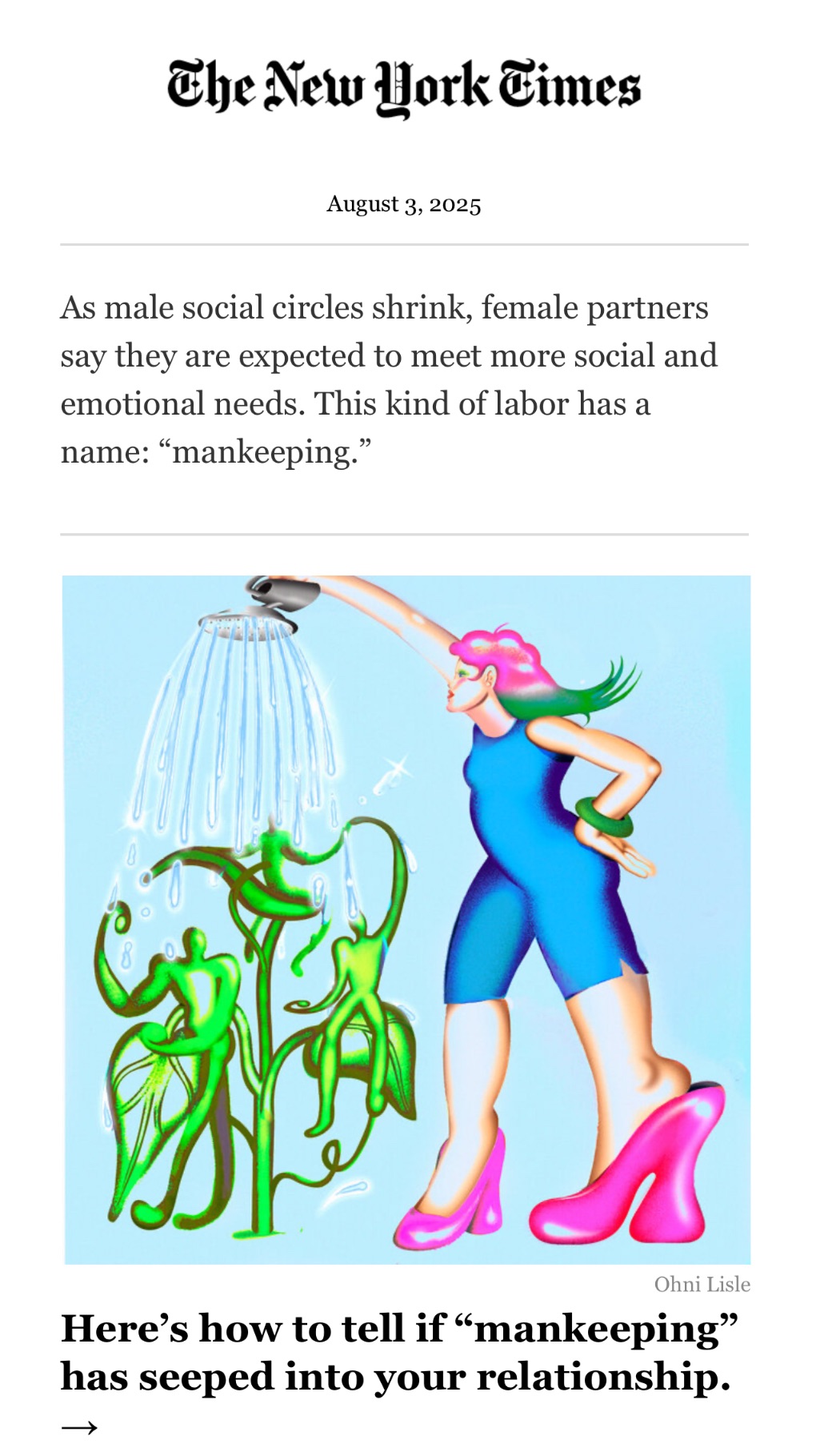There’s a certain smell to soft tyranny. It doesn’t arrive with tanks or jackboots, but with think-pieces and therapy terms. And today’s cultural hand grenade, lobbed by The New York Times under the guise of social science, is a shiny new word called “mankeeping.” If you’ve never heard of it, congratulations—you’ve been too busy living a real life to keep up with Stanford’s latest attempt to pathologize male existence.
The article begins innocently enough. A therapist named Justin Lioi in Brooklyn—because of course it’s Brooklyn—shares that many of his straight male clients confide only in their wives or girlfriends. Rather than seeing this as a mark of trust, intimacy, or partnership, it’s framed as a burden on women. Stanford researcher Angelica Puzio Ferrara even coined the term mankeeping to describe this supposedly lopsided dynamic, where men—brace yourself—rely on their partners for emotional support.
Now stop for a moment and ask yourself: Since when is emotional dependence within a committed relationship a cultural crisis? Since it became a weapon in the war against men, marriage, and the Western order.
The Real Purpose of “Mankeeping”
This isn’t about improving relationships. It’s not even about promoting women’s health. It’s about turning men into social lepers and women into resentful loners. It’s another front in the long campaign to dismantle the foundational bonds of Western society—faith, family, and fidelity—and replace them with something colder, weaker, and easier to control.
They’ve tried for decades to convince men that masculinity is toxic. Now they’ve pivoted: masculinity isn’t just dangerous—it’s needy. It’s draining. It’s a parasite on the emotional labor of women. The next logical step, they suggest, is for women to opt out entirely.
That’s not a diagnosis. That’s a demolition plan.
Divide the Sexes, Conquer the People
If you can convince women that male emotional needs are abusive—and men that their feelings are a burden—you can do tremendous damage without firing a shot. You don’t need to ban marriage. Just make it look exhausting. Make love feel like labor. Then sit back and watch the collapse:
Marriage rates fall.
Birthrates implode.
Men withdraw into screens.
Women embrace state-sponsored singleness.
The government fills the vacuum.
It’s not speculation. It’s the pattern. Break the home, build the State. And right now, “mankeeping” is just another crowbar to pry husband and wife apart.
The Marxist Fingerprints Are All Over It
This is Marxism 101, repackaged in therapist-speak. The assumption is always the same: human relationships are about power, not partnership. Love is exploitation. Support is servitude. If you’re a woman comforting your man, it’s not affection—it’s unpaid labor. And suddenly, the only solution is a revolutionary one: reject tradition, reject roles, and reject the very idea that a man and woman might need each other in different ways.
They’re not trying to liberate anyone. They’re trying to atomize everyone.
What This Means for You
If you’re a man, this is your wake-up call. They are not interested in your growth. They want your guilt. If you express emotion, they’ll say you’re fragile. If you don’t, they’ll call you a robot. There is no winning on their battlefield—so don’t play their game.
And if you’re a woman, don’t let them turn you against the very men who are trying to build with you, protect you, and carry this crumbling nation forward. The truth is, strong women have always supported strong men—not because they were tricked into it, but because they knew it was right. That’s how civilizations survive.
Final Word: Reject the Lie, Reclaim the Order
We don’t need new labels. We need old truths. That marriage is a covenant, not a contract. That men need women and women need men—not to survive emotionally, but to thrive spiritually, socially, and civilizationally. That emotional labor, when done in love, isn’t exploitation—it’s what holds the world together.
“Mankeeping” isn’t a diagnosis. It’s a deception. And like every lie rooted in resentment and division, it deserves to be dragged into the light and buried by the truth.
We stand for men who lead. We stand for women who build. And we stand for the ancient, holy, and unbreakable bond between them—no matter what Stanford or the New York Times says.



